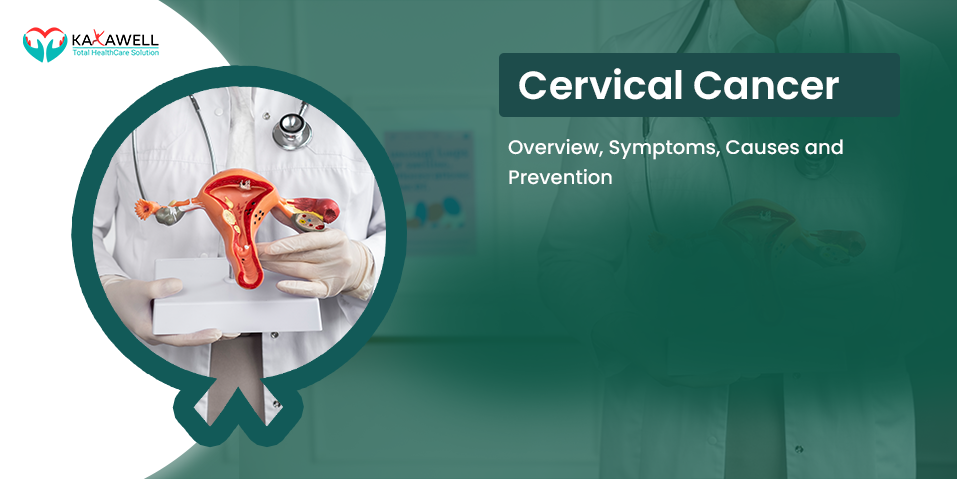Cervical cancer is a form of cancer that occurs in the cervix cells — the lower part of the uterus that is linked to the vagina.
Specific strains of the human papillomavirus ( HPV), a sexually transmitted infection, lead to most cervical cancer.
The body’s immune system typically prevents the virus from doing harm when exposed to HPV. However, the virus survives for years in a small percentage of people, contributing to the process which causes some cervical cells to become cancer cells.
By having screening tests, and having a vaccine that protects against HPV infection, you will reduce the risk of developing cervical cancer.
Symptoms Cervical Cancer
An individual may experience no symptoms at all during the early stages of cervical cancer.
This will result in women should getting regular cervical smear tests or Pap tests.
A Pap test is preventive. This is aimed not at detecting cancer but at identifying any cell changes which indicate the potential cancer development so that a person can take early action to treat this.
The most common symptoms of cervical cancer are:
- Bleeding between periods
- Bleeding after sexual intercourse
- Bleeding in post-menopausal women
- Discomfort during sexual intercourse
- Vaginal discharge with a strong odor
- Vaginal discharge tinged with blood
- Pelvic pain
These symptoms can have other causes, including infection. Someone having any of those symptoms should see a physician.
When to call your doctor
Take your doctor an appointment if you have any signs or symptoms that bother you.
Causes of Cervical Cancer
Most cervical cancer cases are caused by the sexually transmitted human papillomavirus (HPV). It’s the same virus which causes genital warts.
There are about 100 different strains of HPV. Only certain types cause cervical cancer. The two types which cause cancer most commonly are HPV-16 and HPV-18.
Getting diagnosed with a cancer-causing HPV strain does not mean you are going to get cervical cancer. Your immune system eliminates the vast majority of HPV infections, often within two years.
HPV can also cause other cancers in women and men. These include:
- Vulvar Cancer
- Vaginal Cancer
- Penile Cancer
- Anal Cancer
- Rectal Cancer
- Throat Cancer
HPV is a very common infection. Find out what percentage of sexually active adults will get it at some point in their lifetime.
Risk Factors
Cervical cancers are caused by one of the high-risk forms of HPV infections. However, since not all people who are infected with HPV will develop cancer, other factors are likely to also play a role in cervical cancer development. Some risk factors that increase a woman’s risk of developing cervical cancer have been identified:
- Tobacco smoking
- HIV infection
- Immune system suppression
- Past or current Chlamydia infection
- Overweight
- Having three or more full-term pregnancies
- Long-term use of oral contraceptives (although when contraceptive
pills are stopped the risk returns to normal) - First full-term pregnancy before age 17
- Poverty
- Family history of cervical cancer
Complications
Cervical cancer complications can occur as a side effect of treatment and as a consequence of advanced cervical cancer.
Pain
Having cancer does not always mean having pain. Pain rarely ever constitutes a symptom of early cancer. But advanced cancer patients do not always have suffering. It may also cause serious pain if cancer spreads through the nerve endings, bones or muscles. It’s important to manage the pain effectively and if the pain medicine is not helping you then you should talk to your doctor. However, it is normal to use a variety of effective painkilling medications. Depending on the levels of pain, they can range from codeine and morphine.
Kidney Failure
In some cases of advanced cervical cancer, cancer can block urine out of the kidneys. The build-up of urine inside the kidneys can cause the kidneys to become swollen and stretched and in severe cases can lead to kidney failure.
Blood clots
As with any other cancer, cervical cancer can make the blood more prone to forming clots. Bed rest after surgery and chemotherapy can also raise the risk of a clot forming. Deep venous thrombosis (DVT) may develop in some women with cervical cancer. This needs to be treated in case it travels to the lungs, which can be fatal.
Bleeding
If cancer spreads through your vagina, intestine or bladder, it may cause significant damage, leading to bleeding. Bleeding may occur in your vagina, rectum, or you may pass through the blood while urinating.
Vaginal Discharge
Another rare but distressing complication of advanced cervical cancer is an unpleasant smell discharge of the vagina.
The discharge may occur for a number of reasons, such as tissue breakdown, bladder or bowel leakage out of the vagina, or vaginal bacterial infection. Antibiotics can be used for the treatment of infections.
Prevention
To reduce your risk of cervical cancer:
Ask your doctor about the HPV vaccine. Receiving a vaccine to avoid HPV infection can lower the risk of cervical cancer and other cancers associated with HPV. Ask your doctor if you should get an HPV vaccine.
Have routine Pap tests. Pap tests can detect precancerous cervical conditions, so they can be monitored or treated to prevent cervical cancer. Many medical institutions, at age 21, recommend beginning daily Pap tests and repeating them every few years.
Practice safe sex. Reduce the risk of cervical cancer by taking steps to avoid sexually transmitted diseases, such as using a condom if you have intercourse and restricting the number of sexual partners that you have.
Don’t smoke. If you don’t smoke, don’t start. If you do smoke, discuss strategies with your doctor to help you quit.

Leave a Reply
You must be logged in to post a comment.